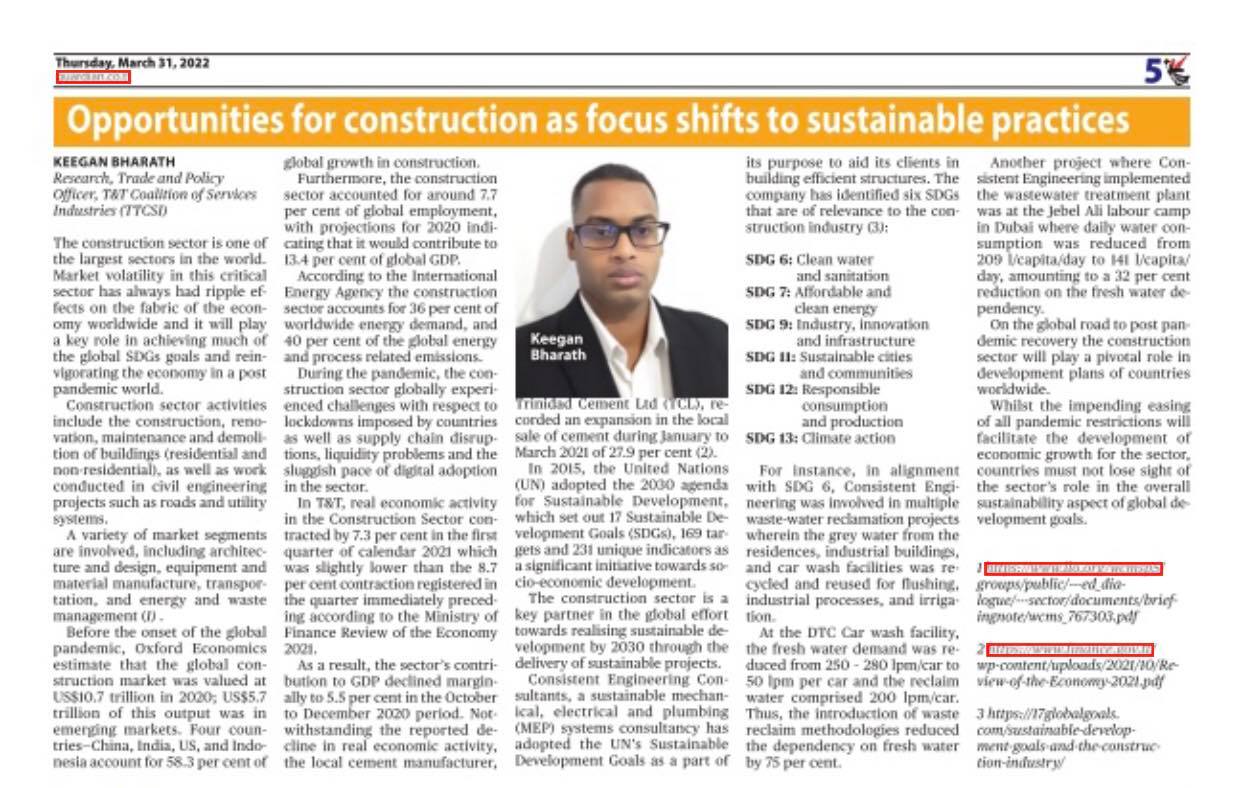by 𝐊𝐄𝐄𝐆𝐀𝐍 𝐁𝐇𝐀𝐑𝐀𝐓𝐇 – 𝐌𝐚𝐧𝐚𝐠𝐞𝐫, 𝐈𝐧𝐭𝐞𝐫𝐧𝐚𝐭𝐢𝐨𝐧𝐚𝐥 𝐓𝐫𝐚𝐝𝐞 & 𝐌𝐚𝐫𝐤𝐞𝐭 𝐈𝐧𝐭𝐞𝐥𝐥𝐢𝐠𝐞𝐧𝐜𝐞 𝐔𝐧𝐢𝐭, 𝐓&𝐓 𝐂𝐨𝐚𝐥𝐢𝐭𝐢𝐨𝐧 𝐨𝐟 𝐒𝐞𝐫𝐯𝐢𝐜𝐞𝐬 𝐈𝐧𝐝𝐮𝐬𝐭𝐫𝐢𝐞𝐬 (𝐓𝐓𝐂𝐒𝐈)
The construction sector is one of the largest sectors in the world. Market volatility in this critical sector has always had ripple effects on the fabric of the economy worldwide and it will play a key role in achieving much of the global SDGs goals and reinvigorating the economy in a post pandemic world.
Construction sector activities include the construction, renovation, maintenance and demolition of buildings (residential and non-residential), as well as work conducted in civil engineering projects such as roads and utility systems.
A variety of market segments are involved, including architecture and design, equipment and material manufacture, transportation, and energy and waste management (1) .
Before the onset of the global pandemic, Oxford Economics estimate that the global construction market was valued at US$10.7 trillion in 2020; US$5.7 trillion of this output was in emerging markets. Four countries—China, India, US, and Indonesia account for 58.3 per cent of global growth in construction.
Furthermore, the construction sector accounted for around 7.7 per cent of global employment, with projections for 2020 indicating that it would contribute to 13.4 per cent of global GDP.
According to the International Energy Agency the construction sector accounts for 36 per cent of worldwide energy demand, and 40 per cent of the global energy and process related emissions.
During the pandemic, the construction sector globally experienced challenges with respect to lockdowns imposed by countries as well as supply chain disruptions, liquidity problems and the sluggish pace of digital adoption in the sector.
In T&T, real economic activity in the Construction Sector contracted by 7.3 per cent in the first quarter of calendar 2021 which was slightly lower than the 8.7 per cent contraction registered in the quarter immediately preceding according to the Ministry of Finance Review of the Economy 2021.
As a result, the sector’s contribution to GDP declined marginally to 5.5 per cent in the October to December 2020 period. Notwithstanding the reported decline in real economic activity, the local cement manufacturer, Trinidad Cement Ltd (TCL), recorded an expansion in the local sale of cement during January to March 2021 of 27.9 per cent (2).
In 2015, the United Nations (UN) adopted the 2030 agenda for Sustainable Development, which set out 17 Sustainable Development Goals (SDGs), 169 targets and 231 unique indicators as a significant initiative towards socio-economic development.
The construction sector is a key partner in the global effort towards realising sustainable development by 2030 through the delivery of sustainable projects. Consistent Engineering Consultants, a sustainable mechanical, electrical and plumbing (MEP) systems consultancy has adopted the UN’s Sustainable Development Goals as a part of its purpose to aid its clients in building efficient structures. The company has identified six SDGs that are of relevance to the construction industry (3):
SDG 6: Clean water and sanitation
SDG 7: Affordable and clean energy
SDG 9: Industry, innovation and infrastructure
SDG 11: Sustainable cities and communities
SDG 12: Responsible consumption and production
SDG 13: Climate action
For instance, in alignment with SDG 6, Consistent Engineering was involved in multiple waste-water reclamation projects wherein the grey water from the residences, industrial buildings, and car wash facilities was recycled and reused for flushing, industrial processes, and irrigation.
At the DTC Car wash facility, the fresh water demand was reduced from 250 – 280 lpm/car to 50 lpm per car and the reclaim water comprised 200 lpm/car.
Thus, the introduction of waste reclaim methodologies reduced the dependency on fresh water by 75 per cent.
Another project where Consistent Engineering implemented the wastewater treatment plant was at the Jebel Ali labour camp in Dubai where daily water consumption was reduced from 209 l/capita/day to 141 l/capita/ day, amounting to a 32 per cent reduction on the fresh water dependency.
On the global road to post pandemic recovery the construction sector will play a pivotal role in development plans of countries worldwide.
Whilst the impending easing of all pandemic restrictions will facilitate the development of economic growth for the sector, countries must not lose sight of the sector’s role in the overall sustainability aspect of global development goals.


